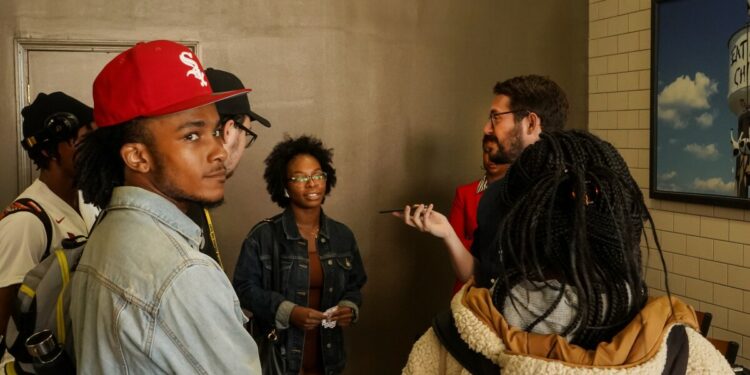Students of Dr. Ann White-Taylor (second from left) in the multimedia communication program at the University of Arkansas at Pine Bluff pose with LRPR News Director Daniel Breen and All Things Considered Host Maggie Ryan.
DB: Farther south in Fayetteville, Donald Culverson was hosting a tailgate along with his fraternity at the RazorbackтАЩs first home game of the season. HeтАЩs a Little Rock native, but says he wants to stay where he is.
тАЬHonestly, I like being up here more than I like being in Little Rock. Just because Little Rock, I feel, is more divided than Fayetteville is.тАЭ
DB: He says he wants to try to stay in Fayetteville for grad school, but heтАЩd still like to see his hometown take a page from the Northwest Arkansas playbook.
тАЬJust more emphasis on bringing the community togetherтАж bringing people from low-income areas, making connections with people from high-income areas, the middle class, so that everybodyтАЩs aware of what everybody else deals with on a daily basis, and just be more compassionate individuals at the end of the day.тАЭ
MR: I think itтАЩs fair to say we all want a little less divisiveness these days. Did you hear that a lot?
DB: Absolutely, and it could be on account of the electionsтАФa pretty divisive time in generalтАФbut I think it definitely did reflect the overall sentiment of this new generation of voters. A lot of them simply donтАЩt care about partisan ideology or rhetoric, they donтАЩt really care whose side is winning. They want things to be better, both in their communities and in others.
DB: But, a lot of young people we talked to said thatтАЩs not possible unless more of their generation gets involved in the democratic process. Marleigh Hayes at Hendrix College says voting is a privilege that not everyone has, but sheтАЩs been encouraged by the turnout sheтАЩs seen at voter registration drives on campus.
тАЬIt is honestly difficult to mobilize young adults in Arkansas to register to vote because we assume weтАЩre a red state, and so I want to kind of help people challenge that and help us realize that, as long as our voices are heard, it is meaningful.тАЭ
DB: Abigail Wells at the University of Central Arkansas says she started becoming involved after her state representative won re-election by just ten votes.
тАЬWhenever people do gain that awareness, theyтАЩre more likely to register to vote. Whenever we were registering people, theyтАЩre like тАШOh, well the presidential [election], I donтАЩt see how it makes that big of an impact.тАЩ And I said, look, from my experience, it was this many votes that actually made a difference.
“I really see people more engaged and interested knowing that a little thing can make a big impact.тАЭ
Source link : http://www.bing.com/news/apiclick.aspx?ref=FexRss&aid=&tid=6724df6e417e43c49d27e5cafa4ee997&url=https%3A%2F%2Fwww.ualrpublicradio.org%2Flocal-regional-news%2F2024-11-01%2Fquality-of-life-community-front-of-mind-for-new-arkansas-voters&c=7443392476280419498&mkt=en-us
Author :
Publish date : 2024-11-01 02:15:00
Copyright for syndicated content belongs to the linked Source.










